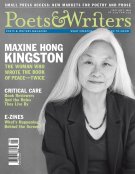Lahiri signed a two-book deal when Interpreter was purchased. She and her editor, Janet Silver, agreed that her next book would be a novel, but Lahiri says she didn't find the leap from short stories to the novel a great one. In fact, it seemed the next logical step. "As the years passed, I felt like my stories were getting longer and more complex," she says. "I already felt that I was pushing the limits on the short stories I originally started out with, which were tight and focused and followed the model of the ten- to twelve-page, concentrated-action type of story.
"I also found that my characters were taking on greater lives," she adds. "I would write pages and pages about them, and they never worked their way into the finished product. So I felt poised to write something longer, but at the same time it was a big move just in terms of working with more material, more characters, more points of view. In that sense it was a difficult transition, but also one that I was eager for."
The question she repeatedly has been asked (and how can you not ask it?) is how she managed the pressure of writing her first novel on the heels of such immediate fame? Actually, she says, it wasn't that difficult, since she was as surpriseder success as anyone. "People always asked, ‘Aren't you afraid of the second book?' I wasn't, because I remembered what it was like to write my first stories, and I kept that same attitude throughout; I just wanted to write a decent novel that would help me to write subsequently better novels. I knew that no matter what, it would be a learning experience for me and that to have any crazy expectations would be a grave mistake."
Besides keeping a similar mental approach, she also tried to maintain the same writing routine, despite the many personal changes in her life. Two years ago, she married Alberto Vourvoulias-Bush, a former deputy editor at Time Latin America and now a consultant for Poder magazine, based in Miami. Their first child, Octavio, recently turned one. Her usual routine, is to write in the mornings ("Never too early; I'm not awake at seven A.M.") until lunch and during her son's naps, going back and forth between longhand and her laptop. "There's a little bit of juggling going on with having a baby, but in general I've tried to stick to a consistent schedule. Sometimes it's more and sometimes it's less."
For a while it will probably be the latter, as she braces for another onslaught of attention. Although she understands the importance of writers communicating with their readers, especially in the world of bookstore promotions and TV book clubs, Lahiri feels that most writers are not necessarily prepared to be mini-celebrities, she especially: "It's an interesting phenomenon that writers have become more vocal and present in the public eye, but I have mixed feelings about it," she says. "I'm always humbled by people's interest, and I often learn a lot from talking with people about my work, but it does feel strange to talk about myself in that way. I'm a private person, and I feel that writing is really my silent medium.
"I guess you could say I'm a purist—you write in silence and then put it out into the world for people to read or not, taking what they will from it, and not really being able to control that," she adds. "I think that's really what ultimately happens between an author and a reader; there's so much that's unspoken. When I think of all the books I've read in my life and I don't know anything about the author, I never met the author—most of them were dead."
With her coast-to-coast tour ready to kick into high gear, Lahiri isn't necessarily thinking about her next project just yet. She'll wait for the fuss to die down, then put The Namesake next to Interpreter and, once again, move on. "I'll probably spend a while working on some stories, but if one of them leads to something bigger then maybe I'll have a novel idea. Who knows?—it's just day by day at this point."
Matthew Solan is a magazine writer and editor based in California. He recently received his MFA in writing from the University of San Francisco.









